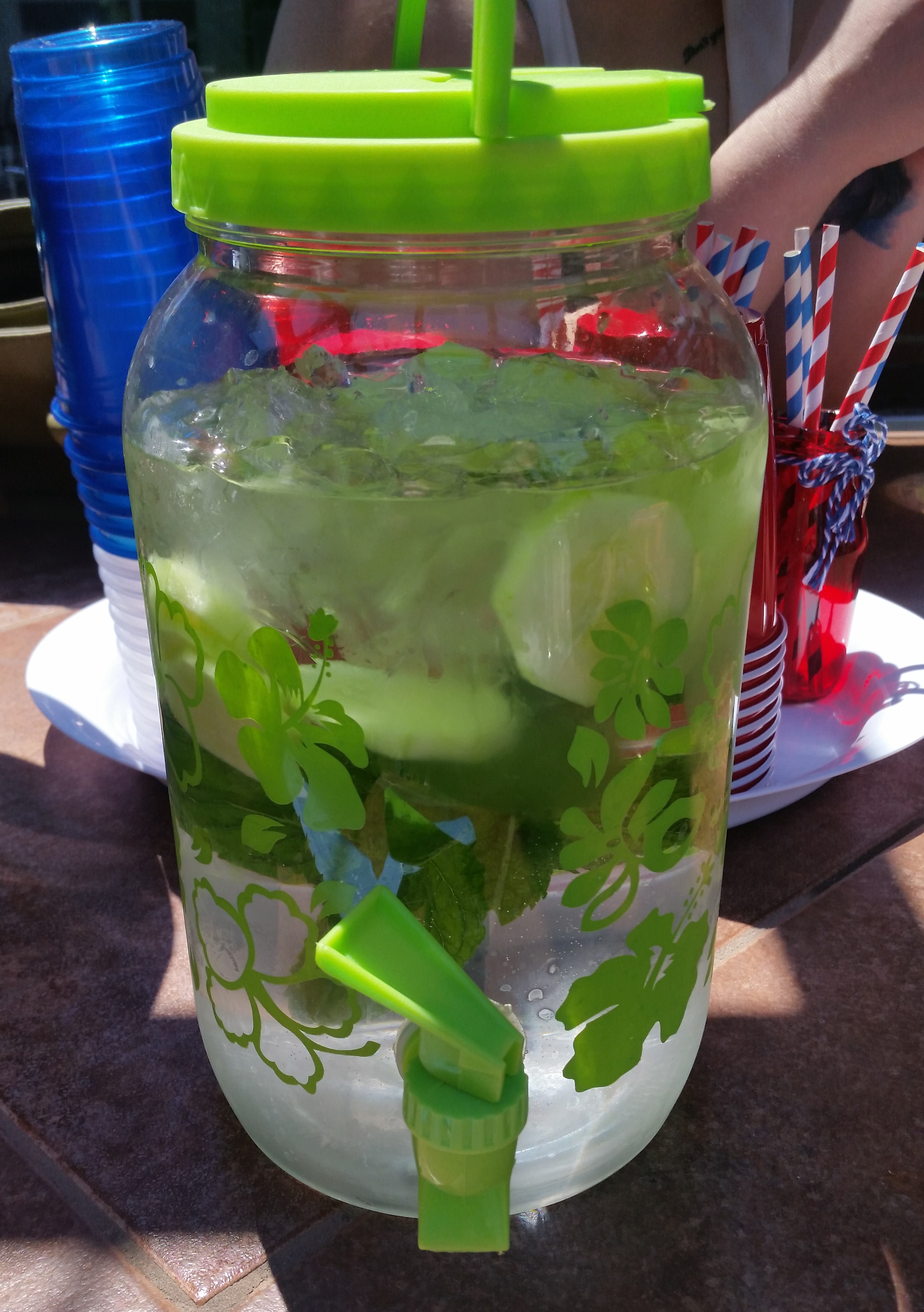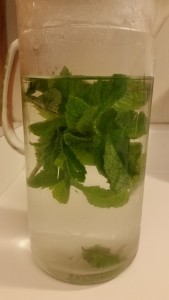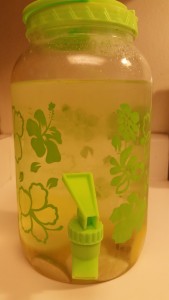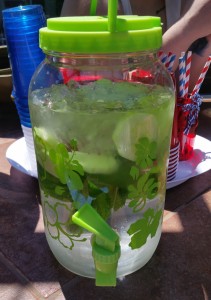My sister and I had a texting conversation about chronic dehydration. Considering humans are supposed to drink half our body weight (lbs.) in ounces of water per day, most people are dehydrated, including myself. For example, a 200-lb person should drink 100-oz of water per day; that is 12.5-8oz glasses of water per day. This means the commonly quoted 8-8oz glasses of water is acceptable for a 128- lb. person (8 glasses x 8 oz./glass x 2 lbs./oz. recommended = 128-lb person). One hundred and twenty-eight pounds is my goal weight, not my current weight, and I don’t drink 8 glasses of water a day.
We often mistake feelings of thirst with hunger. To avoid consuming extra calories from snacking and attempting to eat away thirst, first drink an 8-oz glass of water and wait 20 minutes. If you are still hungry, then have a healthy snack.
To calculate the amount of water in ounces you should drink daily, multiply your body weight by 1/2 if you are not active and 2/3 if you are active.
Recommend watering schedule: Divide your water amount by eight; this is the number of ounces in your glass (not the standard measure of 8oz).·
- 1 glass upon waking first thing before coffee (around 7:00 a.m.) This helps hydrate your body and replenish your organs after a good night’s sleep. Ideally, this glass is thirty minutes to one hour prior to breakfast so you don’t dilute your digestive juices.
- 1 glass an hour after eating breakfast (around 9:00 a.m.) to help nutrients from breakfast absorb into the body. Try not to drink too soon after eating because water will dilute your digestive juices.
- 1 glass half an hour before lunch (around 11:30 a.m.)
- 1 glass an hour after lunch (around 1:30 p.m.) to help nutrients absorb from lunch into the body.
- 1 glass in the afternoon around 3:00 p.m. to prevent snacking.
- 1-2 glasses around 5:00 p.m. Or at least a half an hour before dinner to help from overeating at dinner.
- 1 glass an hour after dinner around 7:00 p.m. to help with absorption.*
- 1 glass an hour before bedtime to help hydrate before sleep.*
*If you have the propensity to wake up at night to use the bathroom, avoid drinking after 6:00 p.m. Also, waking up to pee may be a sign of a more serious problem, and you may need to consult your doctor.
Alternative schedule: if drinking water throughout the day just isn’t your thing, try drinking 1/3 of your daily allotment first thing in the morning, 1/3 an hour before lunch, and the last 1/3 an hour before dinner. Just do your best to get the water into your body.
Water Taste and Flavor
This may sound strange, but there is a taste difference between bottled water brands. Well, I notice a difference anyway. My preference is reverse osmosis water, and my preferred bottled water is Sparkletts or Crystal Geyser. If you are the type of person who does not drink water because it tastes bad, try different brands. Alternatively, you can try flavoring the water with herbs or fruits.
Flavored Water: Fruits and fresh herbs can be used to infuse water with flavor with adding artificial sweeteners or flavorings. You can’t really go wrong with a combination of fruits and herbs, but there are a bunch of ideas from www.infusedwaters.com to start. Some of my favorites are:
- Cucumber: slice 1/2 a cucumber per gallon. Let seep for thirty minutes.
- Cucumber mint: add half a cucumber and one sprig of mint leaves per gallon.
- Mint: one sprig of mint leaves per gallon.
- Lemon: slice one lemon per gallon (remove rind from less bitter taste)
- Lemon strawberry: slice one lemon and 5oz frozen or fresh strawberries per gallon
- Lemon and orange: one lemon and one orange (remove rind from less bitter taste)
- Strawberry lime: slice one lime and 5oz frozen or fresh strawberries per gallon
Over consumption of water: There is a risk of drinking too much water. Being too hydrated can deplete your electrolytes. If you start getting headaches, stop and consult a physician.
Water Weight gain:As you increase your water intake, you may notice an increase in the scale, but do not be alarmed. This increase is just water weight. Water weight is not body mass. The increase water helps improve your organ function and clear metabolic wastes from your body. Additionally, water is a necessary reactant in the breakdown of macromolecules (fats, carbohydrates, proteins, and nucleic acids). In order to lose body mass, your body uses water molecules to break bonds holding fats together. As you increase the amount of water in your body, your body has the ability to increase its metabolism of fat and ultimately reduce the amount of body mass. So don’t worry about a jump in the scale once you start a water regiment. Keep drinking, and your body will thank you.




